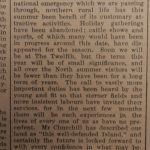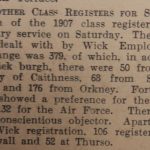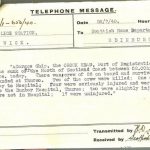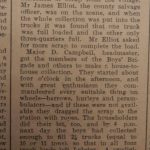On 23 July the Local Defence Volunteer force, or LDV, was officially renamed the Home Guard. Meanwhile, in the Battle of Britain, a coal convoy suffered such heavy losses from German dive-bombers on 25 July that the Admiralty ordered future convoys to take place at night. And, following the French bombing of Gibraltar last week, women and children were evacuated from the territory.
 The John o’Groat Journal this week reflected on the impact of the war on “northern rural life”, especially on local activities and customs: “Holiday gatherings have been abandoned; cattle shows and sports, of which many would have been in progress around this date, have disappeared for the season. Soon we will be at the Twelfth, but the term this year will be of small significance, and all over the North summer visitors will be fewer than they have been for a long term of years.”
The John o’Groat Journal this week reflected on the impact of the war on “northern rural life”, especially on local activities and customs: “Holiday gatherings have been abandoned; cattle shows and sports, of which many would have been in progress around this date, have disappeared for the season. Soon we will be at the Twelfth, but the term this year will be of small significance, and all over the North summer visitors will be fewer than they have been for a long term of years.”
And still conscription continued: another round of registration for national service took place this week, of “men  of the 1907 class”: 379 men enrolled in Wick, including 68 from Sutherland and 176 from Orkney. Of these, 44 showed a preference for the navy, 132 for the RAF; there was one conscientious objector.
of the 1907 class”: 379 men enrolled in Wick, including 68 from Sutherland and 176 from Orkney. Of these, 44 showed a preference for the navy, 132 for the RAF; there was one conscientious objector.
 Merchant seamen whose ships had been sunk by the German blockade were still being landed in Thurso, as the cost of keeping Britain supplied with food and raw materials mounted. On 28 July the Caithness Police recorded that the Crock Head, a cargo ship, had been sunk in the early hours of the morning: “There was a crew of 26 on board and survivors were landed at Thurso. Two of the crew were killed; one died on the way to hospital; four were seriously injured and were admitted to the Dunbar Hospital, Thurso; two were slightly injured and are not in hospital; 17 were uninjured.”
Merchant seamen whose ships had been sunk by the German blockade were still being landed in Thurso, as the cost of keeping Britain supplied with food and raw materials mounted. On 28 July the Caithness Police recorded that the Crock Head, a cargo ship, had been sunk in the early hours of the morning: “There was a crew of 26 on board and survivors were landed at Thurso. Two of the crew were killed; one died on the way to hospital; four were seriously injured and were admitted to the Dunbar Hospital, Thurso; two were slightly injured and are not in hospital; 17 were uninjured.”
In response to a query about school buildings, on 22 July the Director of Education wrote that the only damage so far to any Caithness schools was “broken windows in Pulteneytown Academy as a result of the recent bomb explosion” [of Bank Row on 1 July]. He added that both Wick North School and Castletown Higher Grade School had been occupied by the R.A.F. and, despite the ruling of the education committee a couple of weeks ago, “provision is being made for the provision of Lybster Higher Grade School as an emergency hospital”.
far to any Caithness schools was “broken windows in Pulteneytown Academy as a result of the recent bomb explosion” [of Bank Row on 1 July]. He added that both Wick North School and Castletown Higher Grade School had been occupied by the R.A.F. and, despite the ruling of the education committee a couple of weeks ago, “provision is being made for the provision of Lybster Higher Grade School as an emergency hospital”.
 Finally this week, the John o’Groat Journal reported a remarkable scrap metal drive in Lybster. Two railway trucks had been provided for the village’s scrap, but when all the scrap was loaded one was still a quarter empty. So the Boys’ Brigade started a house-to-house collection to make up the deficit, and “commandeered every suitable thing on wheels – barrows, hurleys and perambulators – and if these were not available, they dragged the scrap to the station with ropes”. By the time they’d finished, Lybster, instead of filling two trucks, had filled no less than four.
Finally this week, the John o’Groat Journal reported a remarkable scrap metal drive in Lybster. Two railway trucks had been provided for the village’s scrap, but when all the scrap was loaded one was still a quarter empty. So the Boys’ Brigade started a house-to-house collection to make up the deficit, and “commandeered every suitable thing on wheels – barrows, hurleys and perambulators – and if these were not available, they dragged the scrap to the station with ropes”. By the time they’d finished, Lybster, instead of filling two trucks, had filled no less than four.
